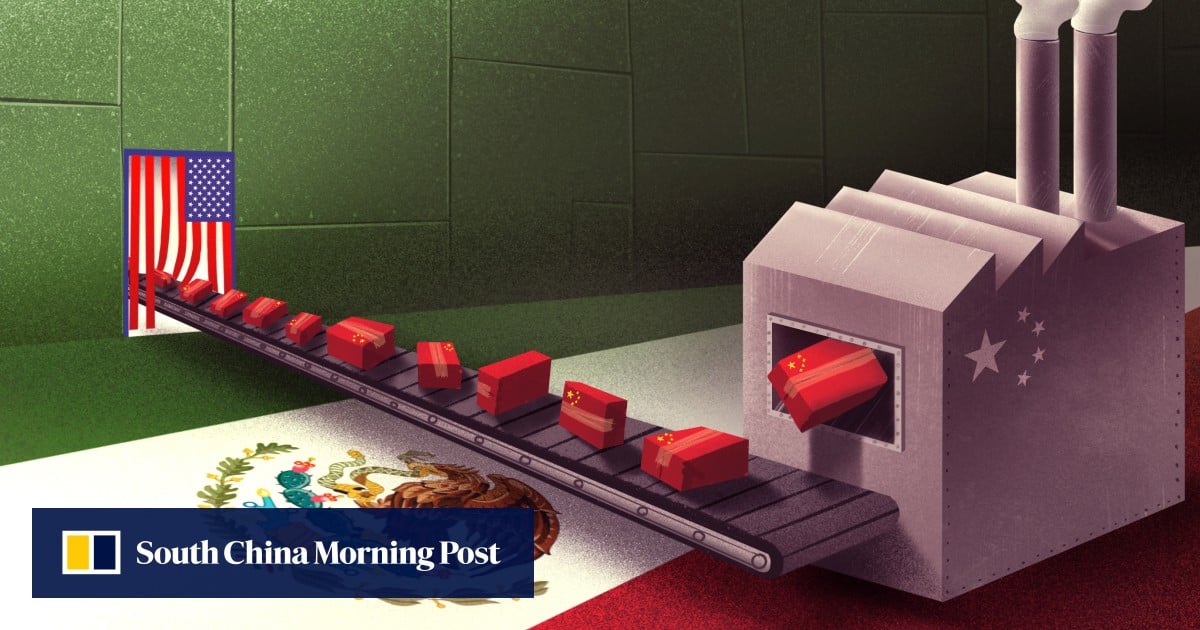The same trend is seen in China’s battery exports to Mexico, particularly the lithium batteries used in electric vehicles.
China’s battery exports to Mexico rose 35 per cent year on year in 2018, followed by 32 per cent in 2021 and 11 per cent in 2022. Last year, the figure saw a 6 per cent drop, according to the GAC.
China cuts tariffs on 143 Argentine products amid tense bilateral ties
China cuts tariffs on 143 Argentine products amid tense bilateral ties
Overall flows into Mexico, a forerunner in the global automotive industry and a country with a vast, young and relatively inexpensive labour force, are following a similar trajectory.
Direct investment from China to Mexico, which reached a single-year high of $587.2 million in 2022, declined by $21 million in the first three quarters of 2023 according to Mexican government data.
But in 2018, Chinese direct investment in Mexico doubled from the 2017 figures.
The investment landscape in Mexico is also undergoing a transformation. More Chinese companies are investing in the US border state of Nuevo Leon, shifting away from the capital Mexico City.
In 2018, Chinese investment in Nuevo Leon rose to 3.4 per cent of all investment in Mexico, up from 0.16 per cent in 2017. Last year, inflows of Chinese direct investment into Nuevo Leon reached 48.3 per cent of net inflows to Mexico.
“One senses that the lion’s share of that orientation is to position those companies to maintain access to the US market and follow major suppliers in that US supply chain,” said Evan Ellis, research professor of Latin American studies at the US Army War College’s Strategic Studies Institute. “While certainly recognising as well that the Mexican market continues to be important.”
China ‘more investible than ever’ for Middle East, Latin America, but West wary
China ‘more investible than ever’ for Middle East, Latin America, but West wary
Monterrey, capital of Nuevo Leon, was one of the first cities in Mexico to develop an automotive industry and hosts factories for many multinational companies, including Elon Musk’s Tesla Inc.
That site, some 220km from the US border, “serves as an exceptional gateway to North America and Latin American markets,” Lingong said.
The biggest obstacle to setting up shop in Mexico is that companies will mostly lose money in the beginning
More outposts may be on the way. In November, the Investment Research Centre at Beijing’s Cheung Kong Graduate School of Business led a 40-person team of executives in manufacturing and logistics on a business trip to Mexico.
Mexico still faces “rule-of-law issues” and investors may find a young yet “untrained” labour force, centre director Liu Jing said following a survey of interested entrepreneurs.
“The biggest obstacle to setting up shop in Mexico is that companies will mostly lose money in the beginning, because the costs in Mexico are estimated to be 30-40 per cent higher than in China,” he said. “Many [have] indicated willingness to set up shop [there], but not on a large scale.”
Besides those expensive start-up costs, Chinese manufacturers will have to contend with Mexican labour groups and possibly crime, said Ilaria Mazzocco, trustee chair in Chinese business and economics with the Centre for Strategic and International Studies, a Washington-based think tank.
“Companies will need to be flexible and adapt quickly to adjust to the Mexican environment, but there are obviously significant draws for them as they make plans to enter the American market,” Mazzocco said.
Latin America expert takes over as head of Chinese friendship association
Latin America expert takes over as head of Chinese friendship association
China’s total outbound direct investment grew 11.4 per cent in 2023 to US$130.1 billion, Beijing’s Ministry of Commerce said Thursday.
The population is large and it’s a young demographic, both of which suggest large market potential
Mexico, meanwhile, has urbanised close to the level of developed countries, with a rate of 81 per cent – 15 percentage points higher than China. This means Chinese firms can sell to a population of 129 million with a per-capita income that has risen steadily since 1990.
Access to the US remains the chief motivator for most Chinese investors, but the Mexican market also offers an “insurance policy” because of its rising middle class, said Jayant Menon, a senior fellow at the ISEAS-Yusof Ishak Institute in Singapore.
Chinese cars represented 19.5 per cent of the Mexican domestic market early last year – a 5.8 per cent increase from 2018 according to research by Jose Ignacio Martinez Cortes, coordinator of a trade laboratory at the Centre for International Relations under the National Autonomous University of Mexico.
“Cheaper Chinese products will be competitive there,” said Yun Sun, director of the China programme at the Stimson Centre think tank in Washington. “The population is large and it’s a young demographic, both of which suggest large market potential.”
Chinese carmakers are also looking to take advantage of Mexico’s preferential tariff status in the North American market.
The Mexican government will be particularly sensitive to pressure from Washington because of the close relationship with the United States
The United States–Mexico–Canada Agreement (USMCA) trade deal, ratified in 2018 and entered into force in 2020, mandates automotive companies have 75 per cent of their components manufactured in Mexico, the United States or Canada to qualify for total tariff exemption.
“This has been one of the most outstanding and dynamic effects of the Latin America-China relationship in the last decade,” he said.
However, tensions between the US and China may eventually spill into Mexico, a long-time US ally.
“The Mexican government will be particularly sensitive to pressure from Washington because of the close relationship with the United States,” Mazzocco said.
China sees great potential and room for growth in ties with Mexico: Wang Yi
China sees great potential and room for growth in ties with Mexico: Wang Yi
“I don’t think there will be a blanket ban or restrictions on Chinese investment,” Sun said.
Rules under the USMCA encourage North American sourcing, so if Chinese investment prioritises Mexican sourcing over that of home, “it can avoid potential risks”, said Hale Utar, an associate professor of international economics at Grinnell College in the US.
China’s Ministry of Commerce said at a December news conference that its cooperation with Mexico on new energy vehicles is “normal commercial activity between two sovereign countries”, adding the US has no right to intervene.
Officials in Beijing will support offshoring to Mexico as long as it brings revenue back home, said Chong Ja Ian, an assistant political science professor at the National University of Singapore.
“A lot of Chinese firms are going to be more keen to invest in foreign markets because domestic demand is slowing,” Chong said. “China wouldn’t see it as a [loss of] growth momentum, because location is not as important as ownership.”



